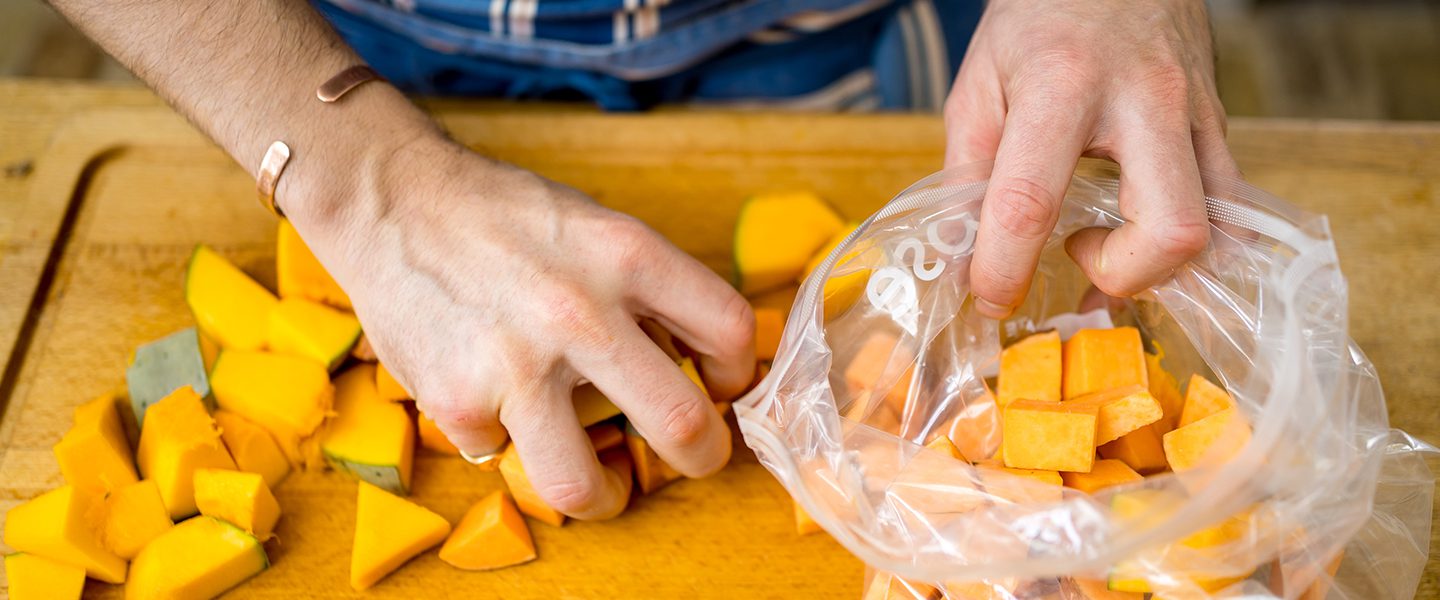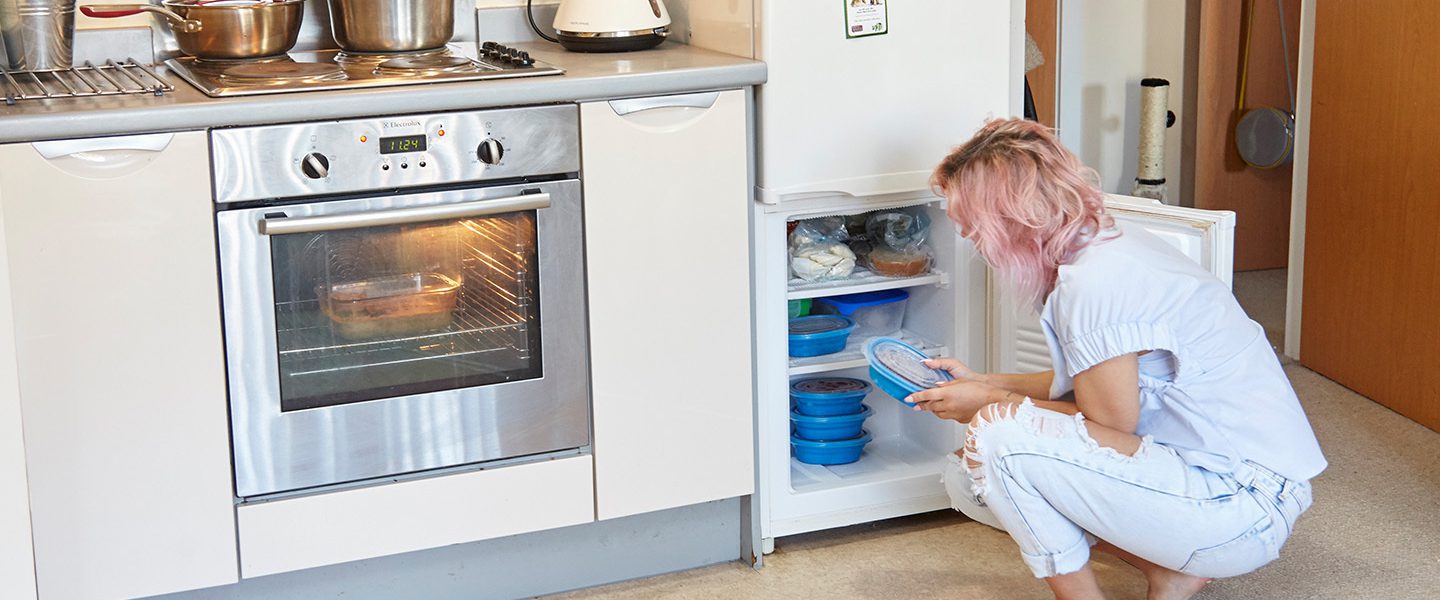15 freezer friendly foods
Roughly, one third of all food produced globally is wasted. Using a freezer can help cut food waste and save money. But which foods can you freeze? And how long can you keep something in the freezer for?
We've put together a list of 15 foods that can be easily frozen, foods that don't freeze so well, and some handy general tips for freezing foods safely. So next time you see them getting close to their use by dates, pop them in the freezer to prevent them from going to waste and enjoy them another time.
These tips are part of something bigger. At Hubbub, we want to see a world where everyone makes choices that are good for the environment. Check out what we do and how your actions add up.
The best way to freeze cheese is to grate it first and then store it in a ziplock bag or a sealed takeaway container. Avoid freezing it in a large block as it can go crumbly. Sprinkle on top of a pizza or pasta dish to give it a brie-lliant kick.
Milk can be frozen and stored for months. It will expand slightly when frozen so use either the original carton, a plastic bottle or container that will allow for it to expand, not glass as this doesn't freeze well, It will also need some time to defrost. Did you know it's easy to make your own plant milks? Check out these simple recipes for oat milk or rice milk. Strain through a cheesecloth after they’ve thawed if they’ve gone a little grainy.
Break them in a bowl and beat until the yolk and egg white is just about blended. Put the mix in an airtight container and label with the date and number of eggs used. When defrosted, the eggs could be used to make delicious courgette fritters or egg fried rice.
Mushrooms, avocados, spinach, rhubarb (yes, it is a vegetable!); beans, carrots, broccoli can all be frozen. If they naturally have a high-water content, it's best for them to be pureed, sautéed, stewed before freezing. Blanch sliced carrots for a few minutes in boiling water, cool them in ice water and then transfer to a freezer bag to be frozen. Previously frozen carrots can be roasted to make amazing dishes such as this carrot top dal, or this simple katsu curry sauce. It’s better to freeze mushrooms cooked as they have a high-water content,. Defrosted mushrooms can be used in a variety of recipes, such as this vegetarian wellington.
Great news cooked rice can be frozen but be sure to freeze it as soon as possible after cooking so it’s safe to eat. Pack the rice into a microwavable container as soon as it’s cooked. When the rice has cooled, seal the container and put straight into the freezer. Make sure to reheat thoroughly so it’s piping hot before eating. You can go savoury with this rice n’ peas dish, or sweet with a rice pudding. Don’t freeze takeaway rice, this needs to be eaten fresh or not at all.
Freeze all kinds of cooked or partially cooked potatoes from mash to roasties. Make sure you do this when they're fully cooled though. For mashed potato, you could either freeze all of it in a freezer bag/container or if you're feeling particularly savvy, freeze your servings by scooping out portions individually like ice-cream scoops. Perfect for dishes such as veggie cottage pie and potato ishtoo. The best bit is you don’t need to defrost these you can just cook them straight from frozen when you want to use them.
Slightly under-cooked pasta is best for freezing, this avoids it going sloppy when you reheat. Before freezing let the pasta cool a little and drizzle it with olive oil to stop it from sticking together in the freezer. Once defrosted, pasta can be enjoyed with various sauces such as roast squash and hazelnut sauce, pumpkin sauce, or with lemon capers and parmesan, whatever tickles your tastebuds!
Bananas freeze fantastically without their skin, just slice them up and pop them in an airtight container before putting in the freezer. Use frozen bananas to make a healthy alternative to ice cream, or coat them in melted chocolate before freezing for a sweet treat.
You butter believe it, it freezes beautifully. Tried making homemade herb butter? You can save it for a later date by wrapping it tightly in aluminium foil, beeswax wrap or plastic freezer wrap or place it inside container or freezer bag. To thaw it quickly, you can grate it or microwave it…or go slow and let it defrost over time in the fridge.
Grown or bought a glut? Blitz before freezing and keep in a sealed container. You'll have tomatoes ready for curry sauces and soups.
Whether it's homemade banana bread, Irish soda bread or shop-bought bread, you could slice it before you freeze to keep a constant supply of bread ready to toast fresh.
Berries freeze nicely, although they may go a bit squidgy when defrosting. Use as ice cubes to chill your beverages, sprinkle on top of your porridge, pop them in a smoothie, or whip up a seasonal summer pudding.
Chopped up chillies and herbs: Seal in a clip lock box to avoid frostbite. Some herbs don’t freeze so well. See below.
Believe it or not, they can all go in in the freezer. If you have any left that is. Wrap well, so they don’t get frost bite. Lacking inspiration for sweet treats? Why not try these vegan brownies, or this iced carrot cake!
Wine can be frozen, just like water (but tastier). It works best with wines that are naturally served chilled (like white, rose or a Beauj for the wine buffs out there).
Foods that don't freeze so well
- Some herbs: Basil, chives and parsley turn brown in the freezer.
- Yogurt and sour cream: Use up before heading off on holiday.
- Some dairy: Soft cheeses, cream cheese, cottage cheese, mayonnaise and sour cream.
- Fresh salad greens: Finish off that lonely lettuce with our delicious fattoush recipe.
- Dishes with crumb toppings: The once crispy top will go soggy after freezing.
General tips for freezing food
- Let all food reach room temperature before freezing.
- Be savvy with your ice cube tray - you can use it to freeze stock, liquid and even eggs. Creates perfect portion sizes, too.
- Never refreeze raw meat that has been frozen and then thawed. Never let meat defrost outside of the fridge overnight, always keep chilled.
- Try to freeze everything at its freshest either when it's just been bought or cooked.
- Make sure the freezer isn't so packed that air can't circulate.
- Try and remember what you have in the freezer and try and eat within nine months to a year.
Hungry for more?
If food waste were a country, it would be the third biggest polluter in the world. Find out how our campaigns have been shifting behaviours to take a bite out of the problem.
We do more than food.
Ever wondered what to do with your old clothes, or how to make your smartphone last longer?

